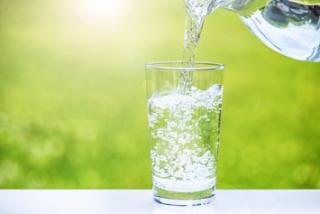Hanover Water Department has levels of PFAS6 above the Drinking Water Standard 11/4/21

Initial test results of our Granular Activated Carbon (GAC), which was authorized by DEP, show promising results and a deep reduction in PFAS levels at the Pond Street Plant. On October 19, 2021, our Test Filter showed “No Detected” PFAS in its effluent. If additional tests yield this result, we will petition the Mass DEP to change our media in the remaining two filters as our solution to PFAS.
Ultimately, we anticipate that full implementation of GAC will bring PFAS levels at the Pond Street Water Treatment Plant well below 20 ppt - the state threshold (70 ppt is the federal guideline).
We’re hoping to receive our October 12th, October 26th, and November 2nd test results soon from the testing lab.
I hope that this information helps to alleviate some of the concerns about PFAS and shows that we are on the right track towards compliance.
Joe Colangelo
Hanover Town Manager
What Happened?
Our water system recently violated a drinking water standard and we are taking the following corrective actions:
Low PFAS Water
charge during posted hours (currently, 8 am to 8 pm, 7 days a week).
GAC Filter Pilot Study
be compete sometime in early November of 2021.
What Does This Mean?
This is not an emergency. If it had been, you would have been notified within 24 hours. Although this is not an emergency, as our customer, you have a right to know what happened, what you should do, and what we are doing to correct this situation.
On October 2, 2020, MassDEP promulgated a new drinking water regulation and a maximum contaminant level (MCL) of 20 nanograms per liter (ng/L - approximately parts per tri ll ion or ppt) for the sum of six per- and polyfluoroalkyl substances (called PFAS6). See our latest test results in the table below.
| PFAS6 Results for Pond Street Water Treatment Plant (01T) | |||||
|---|---|---|---|---|---|
| Quarterly Compliance Period | Monitoring Period | Sample Collection Date | PFAS6 Result (ng/L) | Quarterly Average (ng/L) | PFAS6 MCL (ng/L) |
| Quarter 2, 2021 | Month 1 | 4/26/21 | 16.3 | 22.3 | 20 |
| Month 2 | 5/18/21 | 20.2 | |||
| Month 3 | 6/23/21 | 30.3 | |||
| Quarter 3, 2021 | Month 1 | 7/20/21 | 35.6 | 34.6 | 20 |
| Month 2 | 8/17/21 | 36.1 | |||
| Month 3 | 9/17/21 | 32.2 | |||
Our results are above the MCL for PF AS6. Even though we have been notifying you of our results since we began collecting samples, to comply with the drinking water regulations, we must provide you with this public notice.
Some people who drink water containing these PFAS in excess of the MCL may experience certain adverse effects. These could include effects on the liver, blood, immune system, thyroid, and fetal development. These PFAS may also elevate the risk of certain cancers. For more information on PFAS6, see the attached factsheet and the web links listed at the end of this document.
What Do I Need To Do?
- Consumers in a sensitive subgroup (pregnant or nursing women, infants, and people diagnosed by their health care provider to have a compromised immune system), are advised not to consume,
drink, or cook with water when the level of PF AS6 is above 20 ng/L. - Consumers in sensitive subgroups are advised to use bottled water for drinking water and cooking of foods that absorb water (like pasta).
- For infant formula, use bottled water or use a formula that does not require adding water.
- For older children and adults not in a sensitive subgroup, the 20 ng/L value is applicable to a lifetime of consuming the water. For these groups, shorter duration exposures present less risk. However, if you are concerned about your exposure while steps are being taken to assess and lower the PFAS concentration in the drinking water, use of bottled water will reduce your exposure.
- Bottled water should only be used if it has been tested. The Massachusetts Department of Public Health requires companies licensed to sell or distribute bottled water or carbonated non-alcoholic beverages to test for PFAS. See Mass.gov: Water Quality Standards for Bottled Water in Massachusetts
- In most situations, the water can be safely used for washing foods, brushing teeth, bathing, and showering.
- Boiling the water will not destroy PF AS6 and will somewhat increase its level due to the evaporation of some of the water.
- If you have specific health concerns regarding exposure, you should see the Centers for Disease Control's website and consult a health professional, such as your doctor.
Where Can I Get More Information?
For more information, please contact Neal Merritt at 781-826-3189 or at merritt@hanoverdpw.org, Hanover DPW, 40 Pond Street, Hanover, MA 02339.
What Is PFAS6?
PF AS6 includes perfluorooctanoic acid (PFOA), perfluorooctane sulfonic acid (PFOS), perfluorononanoic acid (PFNA), perfluorohexanesulfonic acid (PFHxS), perfluorodecanoic acid (PFDA) and perfluoroheptanoic acid (PFHpA). PF AS6 are man-made chemicals that have generally been used in the manufacturing of certain firefighting foams, flame and stain-resistant products, and other industrial processes. For additional information, see the following web links.
- MassDEP Fact Sheet - Questions and Answers for Consumers
- CDC ATSDR Information on PFAS for Consumers and Health Professionals
- Massachusetts Department of Public Health information about PFAS in Drinking Water
This notice is provided by: Hanover Water Department, System ID#: 4122000 Date distributed (mailed to residents): November 3, 2021
We will provide public notice updates every three months until the situation has been resolved.
Please share this information with all the other people who drink this water, especially those who may not have received this notice directly (for example, people in apartments, nursing homes, schools, and businesses). You can do this by posting this notice in a public place or distributing copies by hand or mail.

